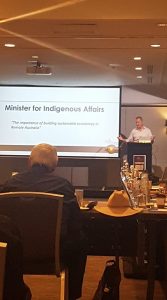
A recent conference hosted by Rise Ventures was held to empower local communities by bringing Mayors and CEOs of regional and remote councils together with key decision makers and drivers of Indigenous policy, including the Minister for Indigenous Affairs, and the Department of Prime Minister and Cabinet. The aim of the conference was to directly debate the economic imbalance experienced in these remote communities as a result of the lack of economic growth and building relationships between stakeholders committed to make a difference.

Senator the Hon. Nigel Scullion announced that IPP will require all businesses to have a skills capacity transfer plan. This will form part of the requirements of business in Australia for significant projects over $7.5million. It furthermore requires at least 50% ownership and control to satisfy the Indigenous business spend requirements. He acknowledged the additional support the sector needs to grow. They will therefore establish a new indigenous business and economic advisory council and MR Warren Mundine AO will be the inaugural chair.
Urgent need for employment
It was unanimously agreed at the conference that there is an urgent need in remote Australia to identify potential areas for investment and opportunities, which will create employment and business enterprise. Although Aboriginal and Torres Strait Islanders have a long 50 000-year history of trade, according to Laura Berry, CEO of Supply Nation, only 0.06% of Australian businesses are run by First Australians today. Not only are they under-represented in business, but this also extends to employment, government and most other public arenas.
A need to change perceptions
One of the biggest factors preventing First Australians from moving forward in these areas is a perception in the Australian business community that Aboriginal and Torres Straight Islanders only run cultural, performance or art-based businesses. This is of course completely incorrect as Aboriginal and Torres Straight Islanders successfully run business in many sectors including consulting, construction cleaning and cryogenics – often winning some of the biggest government contracts being put to tender!
Rebalancing and refocusing: The way forward
Tricia Button, Deputy CEO of the Indigenous Land Corporate (ILC) announced a new strategic direction aimed at actively pursuing Land Acquisition opportunities as well as actively calling for Land Acquisition and Land Management ideas from Indigenous groups and partners. They also aimed to pursue businesses in regions where there have traditionally been lower levels of ILC assistance and investment.
The ILC is also actively pursuing partnerships in the areas of agribusiness, tourism, renewable energies, niche Indigenous products and urban development.
A focus on partnership
The ILC aims to move away from its focus as a sole operator of businesses to one where they partner indigenous groups/operators. Instead of being seen as merely a ‘granter’ the ILC is actively invested in making partnerships easier and embraces the responsibilities of partnerships including shared risks, shared rewards and capacity building. Going forward, their aim is to reduce processes and achieve a more rapid response timeline.
A focus on diversity
Instead of funding the same groups, the ILC will be actively spending their investment capital wisely to ensure greater diversification of where their funds go, broadening the base to ensure they are not funding the same groups, projects and properties on a recurring basis. Going forward, they want to fund larger, higher impact projects with a higher yield of Indigenous benefits.
A focus on entrepreneurship
Kia Dowell, Executive Director, Strategy and Innovation at Indigenous Business Australia (IBA) reiterated the importance of supporting Aboriginal and Torres Strait Islander entrepreneurs and businesses to build business knowledge, skills and capabilities. As the go-to-agency for Aboriginal and Torres Strait islander people, IBA’s newly launched 5-year strategy sees a commitment to delivering business solutions to 5000 additional Aboriginal and Torres Strait Islander entrepreneurs and businesses by 2023.
In support of this, IBA is committed to employing more Aboriginal and Torres Strait Islander people and ensuring they buy more from Aboriginal and Torres Strait Islander businesses.
A focus on investments
IBA is equally committed to making smart choices with their investments to realise maximum benefit for Aboriginal and Torres Strait Islander people. By 2023 they plan to have 100 partnerships with Aboriginal and Torres Strait Islander co-investors, investing at least $250m alongside IBA to generate impact. They plan to invest with their customers, so that their dreams become a reality.
A focus on housing
To support the Aboriginal and Torres Strait Islander people, IBA plans to build useful and smart pathways to assist the Aboriginal and Torres Strait Islander people in buying homes. By 2023 their goal is to have secured stable housing for 70 000 Aboriginal and Torres Strait Islander people.
A pathway forward
The two-day conference was a success in paving the way for open dialogue and marks the beginning of improved collaboration with remote communities to support Indigenous Australians towards greater economic empowerment and opportunity.
